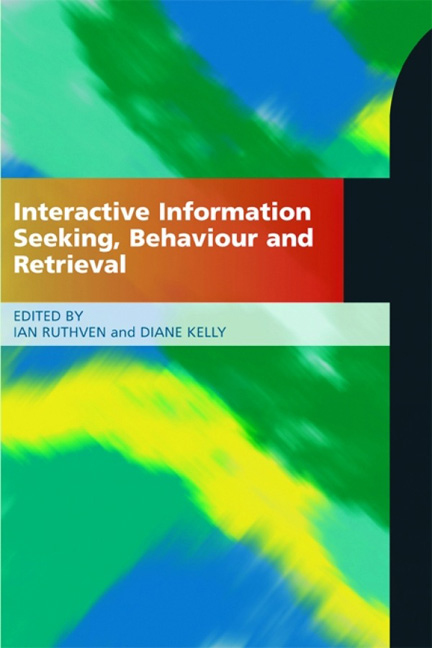Book contents
- Frontmatter
- Dedication
- Contents
- Figures and tables: acknowledgements
- Contributors
- Foreword
- Preface
- 1 Interactive information retrieval: history and background
- 2 Information behavior and seeking
- 3 Task-based information searching and retrieval
- 4 Approaches to investigating information interaction and behaviour
- 5 Information representation
- 6 Access models
- 7 Evaluation
- 8 Interfaces for information retrieval
- 9 Interactive techniques
- 10 Web retrieval, ranking and personalization
- 11 Recommendation, collaboration and social search
- 12 Multimedia: behaviour, interfaces and interaction
- 13 Multimedia: information representation and access
- References
- Index
Preface
Published online by Cambridge University Press: 08 June 2018
- Frontmatter
- Dedication
- Contents
- Figures and tables: acknowledgements
- Contributors
- Foreword
- Preface
- 1 Interactive information retrieval: history and background
- 2 Information behavior and seeking
- 3 Task-based information searching and retrieval
- 4 Approaches to investigating information interaction and behaviour
- 5 Information representation
- 6 Access models
- 7 Evaluation
- 8 Interfaces for information retrieval
- 9 Interactive techniques
- 10 Web retrieval, ranking and personalization
- 11 Recommendation, collaboration and social search
- 12 Multimedia: behaviour, interfaces and interaction
- 13 Multimedia: information representation and access
- References
- Index
Summary
Modern information environments are large, dynamic and complex. In the last decade alone there has been an explosion in the amount of information available to be found and the type of tools one can use to find information. In only a few decades we have moved from interacting with relatively small, carefully curated collections of information, such as those at our local university library or public library, to interacting with large volumes of heterogeneous, unclassified and mixed quality data. There are few industries, research disciplines or human activities that do not require information and one's success in these areas often depends directly on one's ability to find useful information.
Since the development of computerized systems for information access in the late 1950s many interdisciplinary researchers have tried to understand how such systems should be designed, implemented and evaluated. Developing a successful information system requires a solid understanding of users (how users think about, find and make decisions about information), of systems (how information objects should be represented and searched) and of interfaces (how the user and system should interact). However, historically, research about these different aspects has been largely unconnected, especially with regard to userand system-centred research. Much research from the systems field has been largely uninformed by an understanding of information seeking and much research in information seeking lacks a solid perspective of how systems are designed and implemented.
The bridge between user-centred and system-centred research is known as interactive information retrieval, and this is the term we most often use to describe our research alliances. Interactive information retrieval is a rich area of research that uses research from information behaviour and seeking to inform the design of interactive search systems at interface and system levels. The study of interactive information retrieval is useful not only for researchers who wish to design new systems but for anyone who needs to use, commission or evaluate search systems.
This book is an overview of the different specialties that comprise interactive information retrieval. We have called it Interactive Information Seeking, Behaviour and Retrieval in order to cover all important aspects of information retrieval – behaviour and seeking, interaction and retrieval. It shows how foundational work from studies of human information interactions has led to the design of the systems we use every day to find information.
- Type
- Chapter
- Information
- Interactive Information Seeking, Behaviour and Retrieval , pp. xxxiii - xxxviiiPublisher: FacetPrint publication year: 2011



